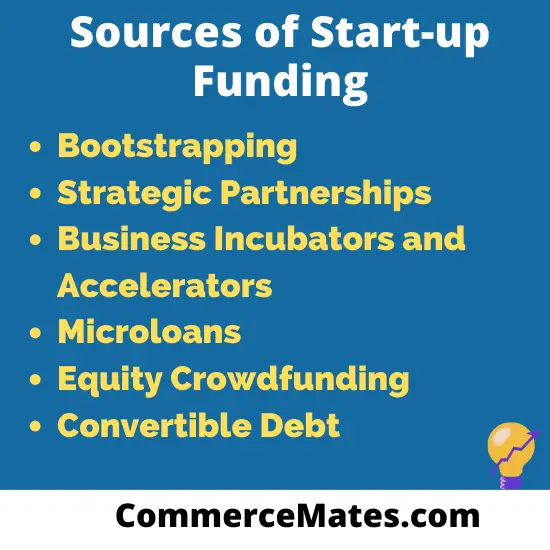Getting started on a business venture typically demands a considerable amount of capital, and placing all your financial hopes in one basket can be quite precarious. However, savvy entrepreneurs understand the importance of exploring various financing avenues to enhance their likelihood of obtaining the necessary funds for launching and expanding their start-ups.
Contents
6 Essential Sources of Start-up Funding
Bootstrapping
Bootstrapping, as an approach to launching a company, revolves around the idea of starting with minimal resources. It sets itself apart from the more conventional route of seeking funding from angel investors or venture capital firms. Instead, bootstrapped founders rely on their personal savings, sheer hard work, efficient operations, rapid inventory turnover, and meticulous cash management to pave their path to success. A noteworthy example of this strategy is seen in how a bootstrapped company would gather preorders for its product and utilize the generated funds to independently build and deliver the product.
In comparison to securing venture capital, bootstrapping offers the enticing advantage of allowing the entrepreneur to retain complete control over the decision-making process. This autonomy empowers them to steer the company according to their own vision. However, it’s important to acknowledge that this financing method also carries inherent risks, potentially exposing the entrepreneur to unnecessary financial challenges along the way. Nonetheless, the determination and resourcefulness of bootstrapped ventures often contribute to their ability to overcome obstacles and achieve sustainable growth.
Strategic Partnerships
Finding funding from traditional sources, like banks or venture capitalists, during a startup’s early stages can be difficult. However, strategic partnerships provide an effective solution. A formal agreement between two companies to work together on a common goal constitutes a strategic partnership. In this situation, you enter into partnerships with one or more investors who give you the money you need to start your business in exchange for a share of your company.
This kind of partnership has a number of benefits because it gives you access to the necessary capital while letting you keep a sizable amount of control over your business. You can strike a balance between getting the money you need and keeping the power to make decisions within your organisation by entering into strategic partnerships.

Business Incubators and Accelerators
Business Incubator refers to an organisation that helps small businesses, startups, and individuals to develop and grow their business. They usually achieve this by offering services like management training, office space training and capital financing.
Microloans
Microloans are created to meet the financial needs of self-employed professionals, start-ups and people that require smaller credit amounts. For low-income families and micro-entrepreneurs who have little to no access to conventional banking institutions, these microfinance loans are a lifeline.
The Reserve Bank of India (RBI) and the government of India have worked together to provide financial assistance to the unbanked and underbanked population. In order to give money to those in need, this effort involves collaborations between the RBI, private limited firms, and Micro Finance firms (MFIs). Along with MFIs and private limited corporations, Non-Governmental Organisations (NGOs) are significant microlenders.
Equity Crowdfunding
Equity crowdfunding serves as a capital-raising method utilized by startups and early-stage companies. Unlike other crowdfunding approaches like rewards or donation-based crowdfunding, equity crowdfunding involves offering the company’s securities to potential investors in exchange for financial backing. Each investor receives a share in the company corresponding to their investment.
Equity crowdfunding distinguishes itself by providing a more conventional means of raising capital, as it involves offering financial securities to investors. The process takes place on dedicated online platforms, leveraging the digital landscape to facilitate a more inclusive and open approach to financing.
In contrast to traditional capital-raising methods that primarily rely on a limited group of professional investors, equity crowdfunding targets a wider range of investors. The core concept behind equity crowdfunding is to gather the necessary capital by securing small contributions from a larger pool of investors.
Convertible Debt
Convertible debt, also known as a convertible note, serves as an investment option favored by early-stage investors like venture capitalists and angel investors. It allows them to provide funding to a startup while deferring the valuation of the startup until a later stage.
The term “seed investment” accurately describes convertible debt as it typically occurs prior to the startup’s first round of stock offering, known as the series A funding round. In its simplest form, convertible debt functions as a loan where an investor provides money to help build the business.
However, unlike traditional bank loans or credit cards, repayment of the loan doesn’t involve returning the borrowed amount with interest. Instead, at a later funding round, the original loan amount is converted into equity, meaning it becomes stocks in the newly established company.
What makes this type of funding particularly attractive to early investors is its unique feature that addresses the risk they undertake. It achieves this by incorporating two vital components: a discount and a cap, thereby providing compensation to venture capitalists or angels.